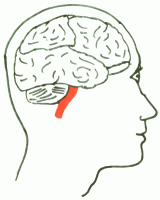What's the cause of migraine?

There's a lot of misunderstanding and controversy about the cause of migraine. What exactly is migraine, and where does it come from? What starts a migraine attack? Let's see if we can get a clear answer to some of these questions.
A word about causes
Before we begin, we need to understand what we mean by the word "cause".
Are we talking about the cause of migraine as a disease, or simply the cause of a specific migraine attack? Usually when someone gets migraine symtpoms, they talk about "triggers". A trigger is something that starts the migraine chain reaction that leads to things like migraine headache or nausea. But a trigger is not a cause of migraine, as a disease. If you're not a
migraineur, you're not going to get a migraine attack, no matter how much coffee you drink or sleep you miss.
So for the most part, when we are talking about the cause of migraine, we want to know what actually causes the disease in the first place, the root cause. But we have a problem...
Mysteries in the brain
The problem is that no one really understands what the cause of migraine is.

The brainstem (in red) - does it hold the secret of migraine? |
We've been working our way backwards as medical technology has developed. First we saw the symptoms, then we began to understand that strange things were happening to the blood vessels in the brain. Next, we learned that the chemicals in your body were sending unusual messages. Finally, our search has led us deep into the upper brain stem.
Merle Diamond, of the Diamond Headache Clinic, said during a Q&A time at WebMD:
...we do know that the migraine generator or control center is located in the brain stem. Which is the area just above the spinal cord, but below the cortex.The brain stem regulates life support in your body - things like breathing, blood pressure and sleep patterns. When a migraine attack begins, it seems that messages from the brain stem are coming out wrong - sending confusing messages that lead to the migraine chain reaction.
But now, research has led us even deeper into the mysteries of the body, into your DNA itself...
The cause of migraine
and genetics
Research is confirming that migraine is a genetically based disease. We're learning that migraine runs in families. If both your parents are migraineurs, chances are you will suffer from migraine as well. Even if only one parent has migraine, there's a 50% chance you'll have it as well.
Recent studies are linking specific genetic defects with migraine. For example, Lyn Griffiths, the director of Griffith University's Genomics Research Centre and professor of molecular genetics has been searching for the cause of migraine. She believes that various flaws in your genes combine to bring on migraine. In the summer of 2004 she discovered some genes related to hormones that may influence migraine. In December 2004 researchers at the Duke University Medical Center reported a genetic defect in some people that causes a decrease in serotonin production.
We're learning that the brain of a migraineur reacts differently to visual input. It seems to be hypersensitive; the brain may over react to triggers and bring on pain that would never occur in a non-sufferer.
All these things are giving us a picture of what the migraine disease is all about. Today migraine is sometimes referred to as a neurological disease based on an inherited genetic abnormality. Migraine is a biological disease.
So what's really going on?
There are a number of things that seem to happen during a migraine attack. Something in the brain stem may start sending out confusing signals. The right messages may be short circuited. Migraine auras may be triggered by a wave of increased electrical activity and blood flow, followed by a time of calm.
The blood vessels or covering of the brain may become inflamed - the cause of migraine headache, bringing on the throbbing pain. A whole number of things may start to happen throughout the body, bringing on the many symptoms of migraine, which can be different in everyone. Some people do not get actual pain, others do. Some experience nausea, some do not. Some see strange blinking lights before migraine, most don't.
If you want to go deeper to understand the latest research on migraine, the brain, and the migraine chain reaction, read What is Migraine? (the scientific story).
If you're confused, you're not alone! As we talked about before, there's a great deal of controversy and misunderstanding about the cause of migraine. We still have a lot to learn about what's really happening. But there are four things you can do right now if you want to learn more:
1. Read about migraine triggers - what starts a migraine attack
2. Read about some of the symptoms of a migraine attack
3. Check out this overview of how to treat a migraine.
4. Keep up with the latest - check out the Migraine and Headache News Blog
5. Subscribe to the free ezine, HeadWay - current research and tried and true tips about headaches, delivered free to your inbox. Subscribe below:
References: Merle Diamond transcript: Managing Migraine Miseryat WebMD (see article for more on the cause of migraine) (2002); MAGNUM article Migraines: Myth Vs Reality; Migraine and Other Headaches by Drs Young and Silberstein (2004); The National Headache Foundation module Migraine Headaches and Treatment and topic sheet Migraine; What are Migraine Headaches? from the National Institute of Neurological Disorders and Stroke (2001)
Enjoy this page? Please pay it forward. Here's how...
Would you prefer to share this page with others by linking to it?
- Click on the HTML link code below.
- Copy and paste it, adding a note of your own, into your blog, a Web page, forums, a blog comment,
your Facebook account, or anywhere that someone would find this page valuable.

